Be sure to check out my Pinterest page for loads of great ideas!





Container Gardening with Herbs: Learn how-to make & grow an herb garden planter!
The container gardener is limited only by your imagination! Whether you have a large garden, raised beds, or the smallest patio or balcony, Jean will show you how you can reap a crop of herbs. It’s all in the harvesting friends!
In todays class held at The Farmington Farmers & Artisans Market, Jean Roman will showcase how you can create thriving herb containers you’ll be able to bring in during the winter as well, if you choose! Whether you are an experienced or novice gardener, this class will be loads of fun with tons of great information!
Lifestyle expert Jean Roman shares gardening and cooking tips
The Market is excited to welcome Jean Roman with her gardening and cooking tips to our 2023 lineup.
Jean is a mother of six, published author, podcaster, YouTuber, organic gardener, organizational guru and influencer who lives in Waterford. A cookbook author and self-professed master gardener with more than 20 years of experience, Jean loves to share her passion for and knowledge of organic gardening, the local food movement and food preparation and preservation.
On her weekly podcast, “For Dragonflies and Me,” Jean gives gardening, cooking and organizational tips and tricks; discusses healthy lifestyles, and welcomes a wide variety of entrepreneurs.
Jean will make six presentations at the Market throughout the season. Please join her as she discusses and demonstrates:
May 13 – Container gardening with herbs
June 17 – Making strawberry jam
July 8 – Easy and delicious pesto sauce
August 5 – Planning your fall garden
Sept. 23 – Homemade marinara sauce
If you enjoyed this blog, please LIKE, Follow, Share & leave me a comment! I love your feedback!
If you aren’t following me on Facebook & Instagram go on over & give a LIKE & Follow me for daily tips & tricks for your home & garden!

Added bonus: You can go to my blog at http://www.fordragonfliesandme.com to purchase my original cookbook, Lovingly Seasoned Eats and Treats in either a spiral bound soft cover OR NEW, a Downloadable PDF version. The cookbook has almost 1000 recipes on almost 500 pages! Check out the Cookbook Testimonials while you’re there!
Until next time remember to,
Eat fresh, shop local & have a happy day,
Jean
All text and images on this site are copyright of For Dragonflies And Me. Unless otherwise noted, you may not use this content.


Jean will be teaching monthly gardening & cooking classes May through October at the beautiful Farmington Farmers & Artisans Market!

May 13th, Mothers Day Weekend
Container Gardening with Herbs: Learn how-to make & grow an herb garden planter!
The container gardener is limited only by your imagination! Whether you have a large garden, raised beds, or the smallest patio or balcony, Jean will show you how you can reap a crop of herbs. It’s all in the harvesting friends! Today Jean Roman will showcase how you can create thriving herb containers you’ll be able to bring in during the winter as well, if you choose! Whether you are an experienced or novice gardener, this class will be loads of fun with tons of great information!
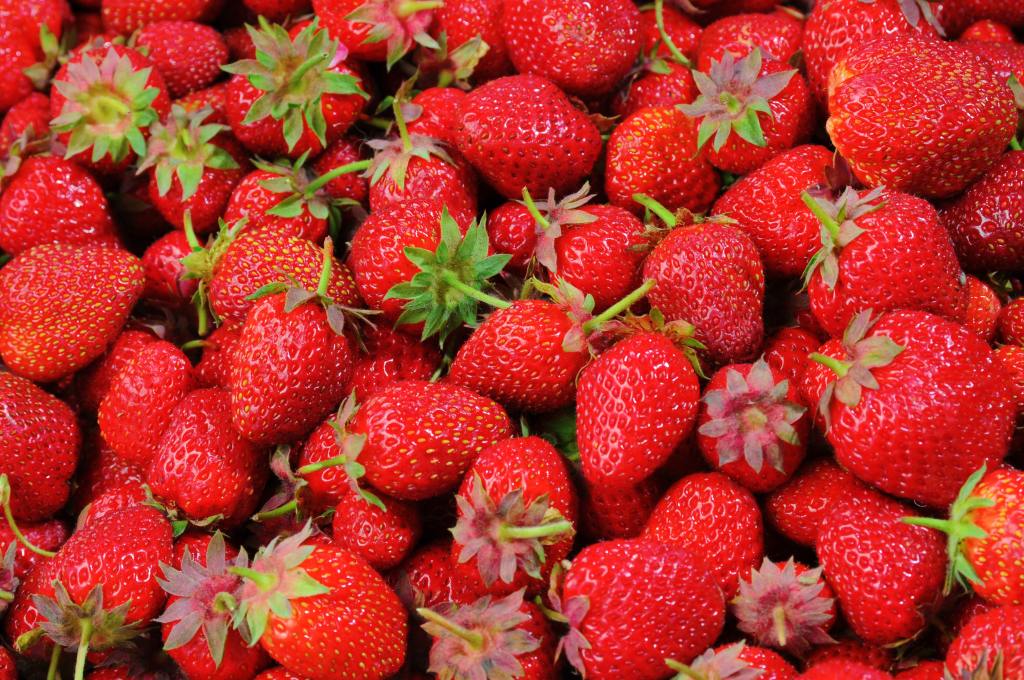
Learn how to make easy freezer strawberry jam!
June 17th
It’s strawberry season in Michigan friends! Join Jean Roman as she teaches you how easy it is to make homemade freezer strawberry jam! Recipe will be included. Roman will have her popular cookbook, Lovingly Seasoned Eats and Treats available at a discounted price for attendees today. Samples will be provided.
How-to Make Homemade Pesto
July 8th, 2023
Easy & Delicious Pesto Sauce- How to make & preserve it! Jean Roman, Author, Podcaster, & Self-professed Master Gardener will teach you how to make her delicious & incredibly easy Pesto recipe, and how to preserve it so you can have it all winter long. She will share tips on how to grow & stimulate continued growth of your plants. Roman will have her popular cookbook, Lovingly Seasoned Eats and Treats available at a discounted price for attendees today. Samples will be provided.

Plan your fall garden now! Lettuces, spinach, kale, broccoli, & more!
August 5th, 2023
Did you know you can continue growing delicious, fresh veggies late into the fall? Well, you can even here in Michigan. All you need to know is the right crops to plant, and how to care for them. Join Jean Roman as she guides you through the steps of preparing for a bountiful fall garden.
How-to Make Marinara Sauce
September 23rd, 2023
Homemade Marinara Sauce- How to make & preserve summer’s bounty! Jean Roman, Author, Podcaster, & Self-professed Master Gardener will teach you how to make her delicious & incredibly easy Marinara sauce recipe from your homegrown tomatoes. Don’t grow your own? That’s ok, Jean will share how you can purchase large quantities at your local farmers market. She will have her popular cookbook, Lovingly Seasoned Eats and Treats available at a discounted price for attendees today. Samples will be provided.

October 15th
Fall Garden Clean Up: 10 Step How-to Fall Vegetable Garden Clean Up
Cleaning up your fall vegetable garden is an important step in preparing for next year’s crop. By removing dead or diseased plants, clearing debris, and adding compost and organic matter to the soil, you can improve the health of your soil and reduce the risk of pests and diseases for years to come. Jean Roman will go over her easy 10 Step How-to Fall Vegetable Garden Clean Up.

Jean will be teaching monthly beginning in April classes at beautiful Goldner Walsh Garden & Home.
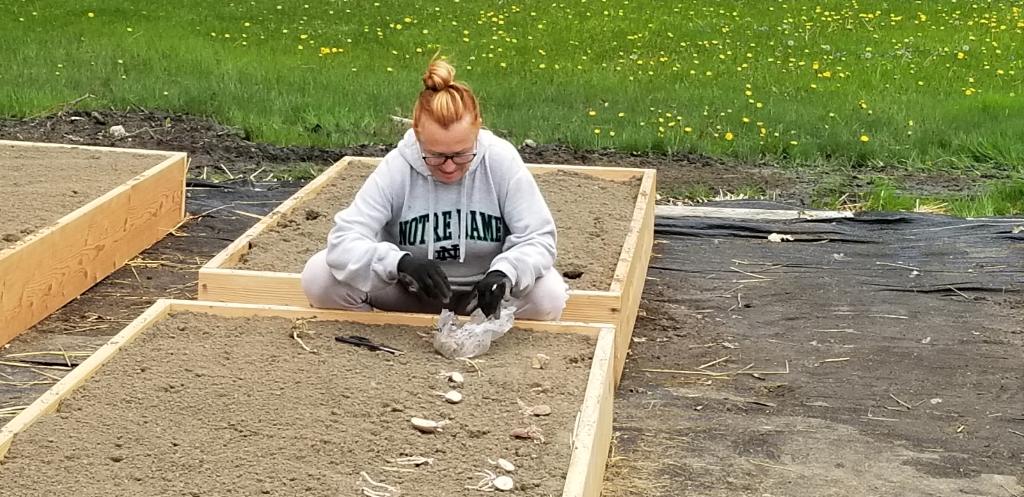
Raised Bed Gardening
April 8, 2023
Raised Bed Gardening: Why raised beds are so much easier to use & grow your veggies in! Jean Roman, Author, Podcaster, & Self-professed Master Gardener will show you why raised beds are more efficient to use for home gardeners. Raised beds offer less weeding, less watering, and eliminates the need for tilling! You’ll wonder why you haven’t been gardening this way!

Heirloom Vegetables
May 6, 2023
Heirloom Vegetables: What is an Heirloom & why should you plant them? Jean Roman, Author, Podcaster, & Self-professed Master Gardener will discuss the value of Heirloom seeds & plants regarding their bio-diversity, natural disease resistance, along with some of her favorite varieties she has grown for over 20 years! She will also discuss the benefits of companion planting and how Heirlooms benefit from it.

Learn how to make easy freezer strawberry jam!
June 10th
It’s strawberry season in Michigan friends! Join Jean Roman as she teaches you how easy it is to make homemade freezer strawberry jam! Recipe will be included. Roman will have her popular cookbook, Lovingly Seasoned Eats and Treats available at a discounted price for attendees today. Samples will be provided.

Plan your fall garden now! Lettuces, spinach, kale, broccoli, & more!
July 15th
Did you know you can continue growing delicious, fresh veggies late into the fall? Well, you can even here in Michigan. All you need to know is the right crops to plant, and how to care for them. Join Jean Roman as she guides you through the steps of preparing for a bountiful fall garden.

How-to Make Marinara Sauce
August 26, 2023
Homemade Marinara Sauce- How to make & preserve summer’s bounty! Jean Roman, Author, Podcaster, & Self-professed Master Gardener will teach you how to make her delicious & incredibly easy Marinara sauce recipe from your homegrown tomatoes. Don’t grow your own? That’s ok, Jean will share how you can purchase large quantities at your local farmers market. She will have her popular cookbook, Lovingly Seasoned Eats and Treats available at a discounted price for attendees today. Samples will be provided.
How-to Make Homemade Pesto
September 9th, 2023
Easy & Delicious Pesto Sauce- How to make & preserve it! Jean Roman, Author, Podcaster, & Self-professed Master Gardener will teach you how to make her delicious & incredibly easy Pesto recipe, and how to preserve it so you can have it all winter long. She will share tips on how to grow & stimulate continued growth of your plants. Roman will have her popular cookbook, Lovingly Seasoned Eats and Treats available at a discounted price for attendees today. Samples will be provided.

October 15th
Fall Garden Clean Up: 10 Step How-to Fall Vegetable Garden Clean Up
Cleaning up your fall vegetable garden is an important step in preparing for next year’s crop. By removing dead or diseased plants, clearing debris, and adding compost and organic matter to the soil, you can improve the health of your soil and reduce the risk of pests and diseases for years to come. Jean Roman will go over her easy 10 Step How-to Fall Vegetable Garden Clean Up.
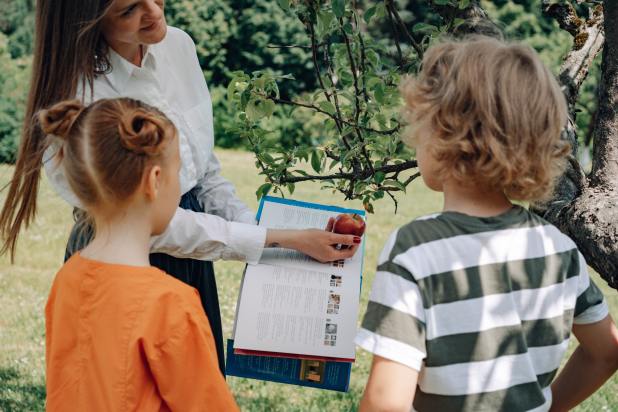
“Change the food in the schools and we can influence how children think. Change the curriculum and teach them how to garden and how to cook and we can show that growing food and cooking and eating together give lasting richness, meaning, and beauty to our lives.” ― Alice Waters
If you have been following me for any length of time, you know I am an advocate for kids in the garden. Over the years, you’ve watched my children grow in my gardens helping to build new raised beds, harvesting the crops, and finally helping prepare the fruits of our labors in the kitchen.
I believe every school in the country should have a school garden in order to teach our children where food comes from. I will be discussing in upcoming blogs how to incorporate kids in the garden, as well as the anonymity of food in our culture today. This is the main reason why I think it is crucial to incorporate school gardens!’
Thankfully, school gardens have become increasingly popular in recent years, and for good reason. Incorporating a garden into a school’s curriculum can have a range of benefits for students, teachers, and the wider community.

In today’s blog post, I am going to provide you with the many benefits of incorporating a school garden and why it’s a worthwhile investment for any educational institution.
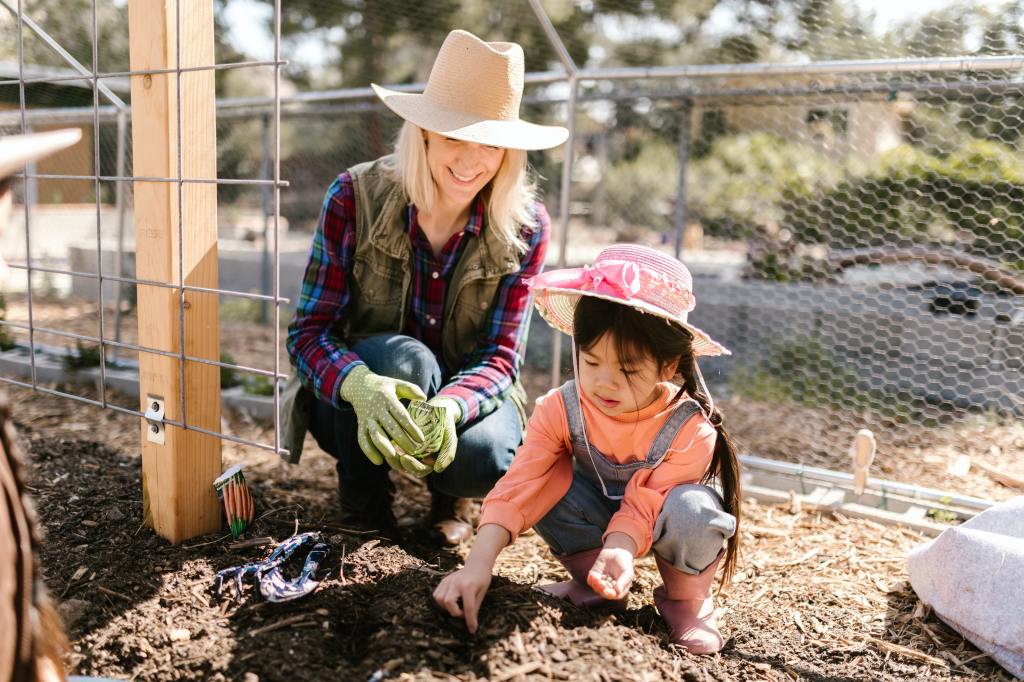
School gardens have the ability to provide a hands-on and engaging way for students to learn about science, math, and other subjects. For example, students can learn about the life cycle of plants, the importance of pollination, and the role of soil nutrients in plant growth. They can also use math skills to measure the growth of plants and calculate the amount of water and fertilizer needed.
School gardens also provide an opportunity to help students develop critical thinking skills as they problem-solve and make decisions about garden design, plant selection, and pest management.
Besides enhancing academic learning, school gardens can also foster teamwork, leadership, and communication skills. Students can work in groups to plan and plant the garden, share responsibilities for watering and weeding, and harvest the produce. They can also take on leadership roles by leading garden tours, organizing fundraising events, and teaching younger students about gardening. Through these activities, students can develop a sense of responsibility, confidence, and teamwork.
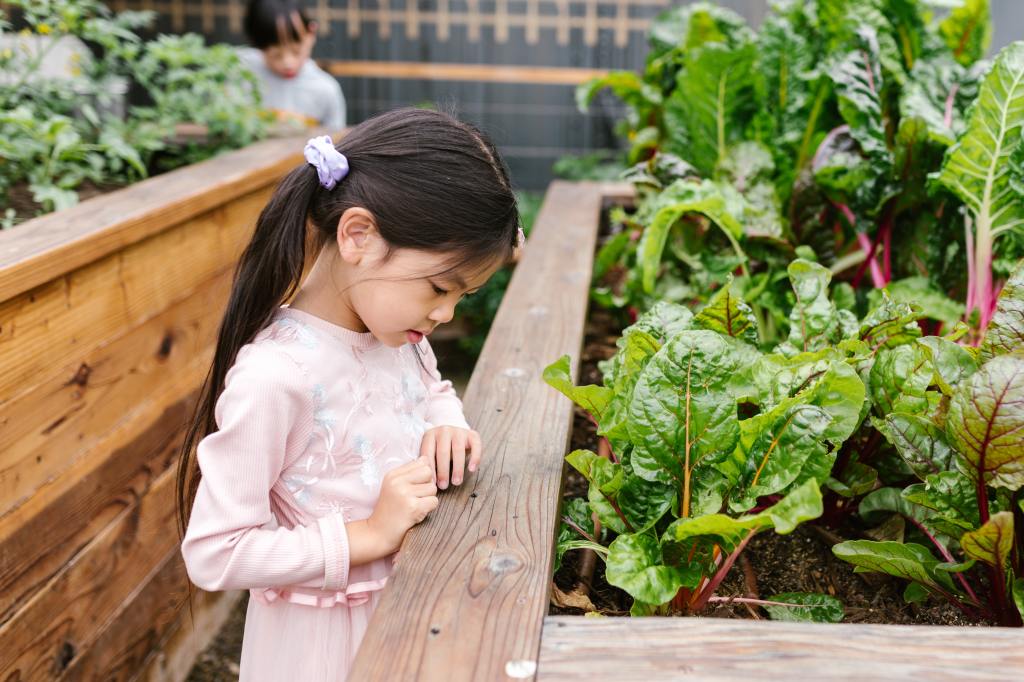
School gardens can promote healthy eating habits and improve overall health. When kids can grow their own fruits and vegetables, they now have the opportunity to learn about the nutritional value of different foods and develop a taste for fresh, healthy produce. They can also learn about the benefits of eating a variety of fruits and vegetables and the importance of balanced diets.
School gardens can help address issues of food insecurity and promote healthy eating habits among students and their families. The produce grown in the garden can be used in school meals or donated to local food banks, providing fresh and nutritious food to those in need. By involving families in the garden project, schools can also encourage parents and caregivers to incorporate healthy foods into their own meals.
And let’s face it… kids are more likely to try something they decided to grow!
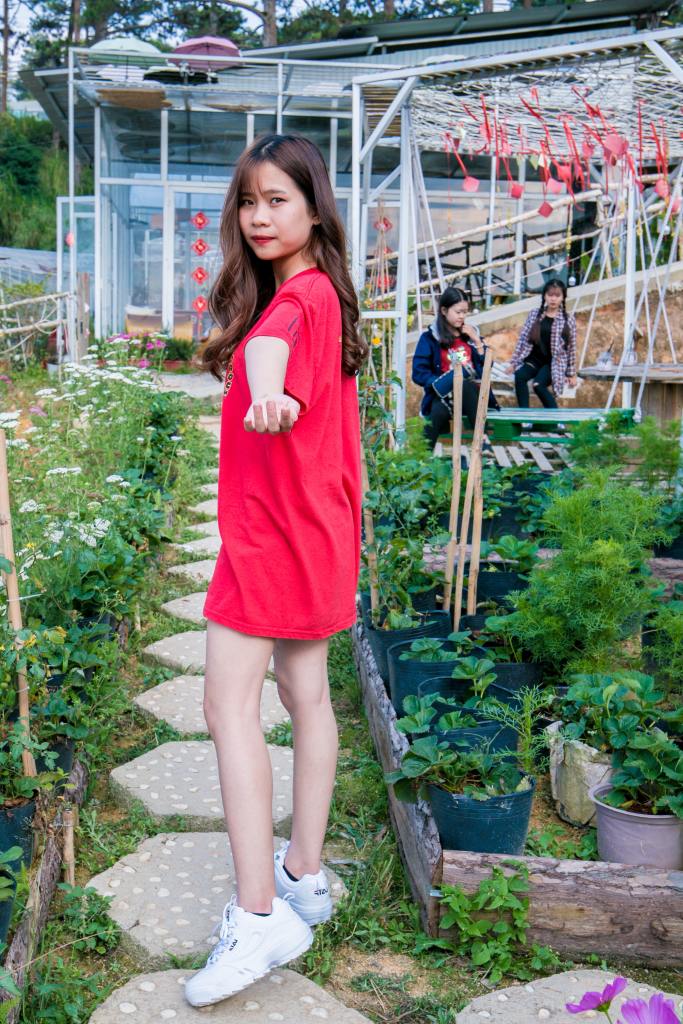
School gardens can promote environmental awareness and encourage sustainable practices. By learning about the importance of soil health, water conservation, and biodiversity, students can develop a sense of stewardship for the environment. They can also learn about the impact of human activities on the environment and ways to reduce their ecological footprint.
Moreover, school gardens can provide habitat for wildlife and attract pollinators such as bees and butterflies. By planting native species and avoiding the use of pesticides and herbicides, school gardens can help support local ecosystems and promote biodiversity.
This is another opportunity to teach kids about the benefits of organic gardening and incorporating companion planting, rather than using harmful chemicals.
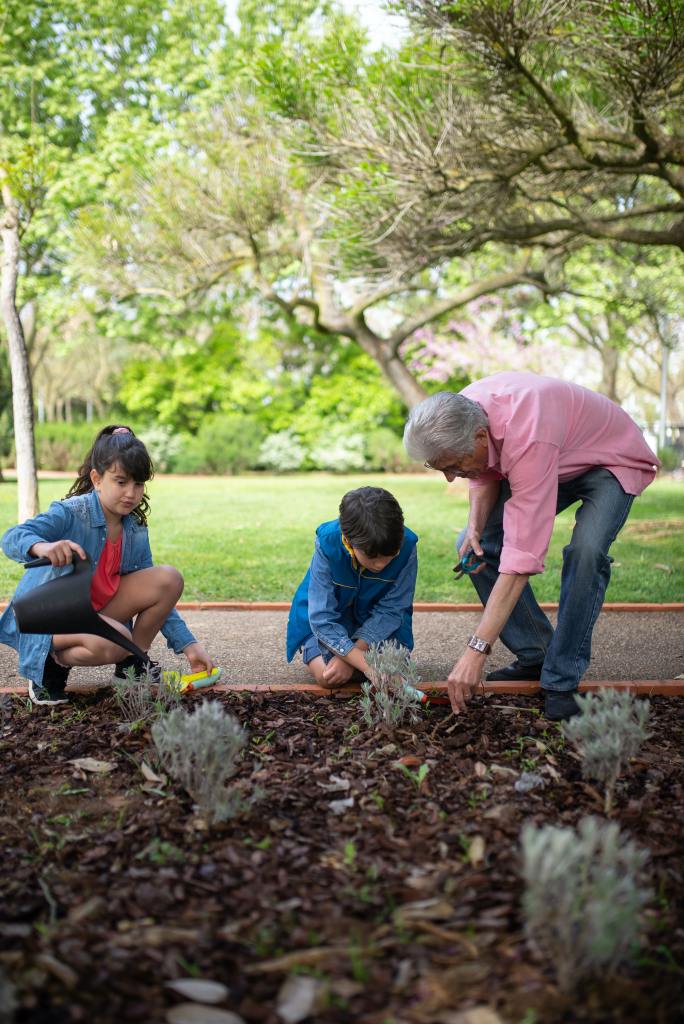
The answer to this question is a responding YES! School gardens have the ability to serve as a valuable resource for the wider community. By donating produce to local food banks or hosting community events such as farmers’ markets or garden tours, schools can help promote healthy eating habits and support local food systems.
They can also serve as a gathering place for community members, fostering social connections and community involvement.
School gardens can also provide opportunities for intergenerational learning and mentorship. By involving older adults or community members with gardening experience, schools can create meaningful connections between generations and promote lifelong learning.
Starting a school garden can seem daunting, but with the right resources and support, it can be a rewarding and successful project. Here are some steps to get started:
Get support from school administrators, teachers, and parents. Starting a school garden requires buy-in from all stakeholders, as well as support for funding and maintenance.
Find a suitable location for the garden. Look for a sunny, well-drained area with access to water and close to the school. Ensure that the site is safe and accessible for students.
Develop a garden plan. Consider the garden’s size, layout, and design, as well as the types of plants to grow. Involve students in the planning process to ensure that the garden reflects their interests and needs.
Secure funding and resources. Look for grants, donations, or partnerships with local organizations or businesses to support the garden’s development and maintenance.
Involve students in the garden project. Encourage students to take ownership of the garden by involving them in the planning, planting, and maintenance. Provide opportunities for leadership and teamwork.
Integrate the garden into the curriculum. Use the garden as a teaching tool to support academic learning and promote healthy lifestyles.
Maintaining a school garden requires ongoing care and attention. Here are some tips to keep the garden healthy and productive:
Develop a maintenance plan. Create a schedule for watering, weeding, fertilizing, and pest management. Involve students in the maintenance activities to ensure that they take ownership of the garden.
Provide ongoing support and training for teachers and volunteers. Ensure that they have the knowledge and skills to maintain the garden and address any issues that may arise.
Use sustainable practices. Avoid the use of pesticides and herbicides, and use organic methods for weed and pest control. Compost garden waste to improve soil health.
Involve the wider community. Encourage families and community members to volunteer in the garden and participate in events such as harvest festivals or farmers’ markets.
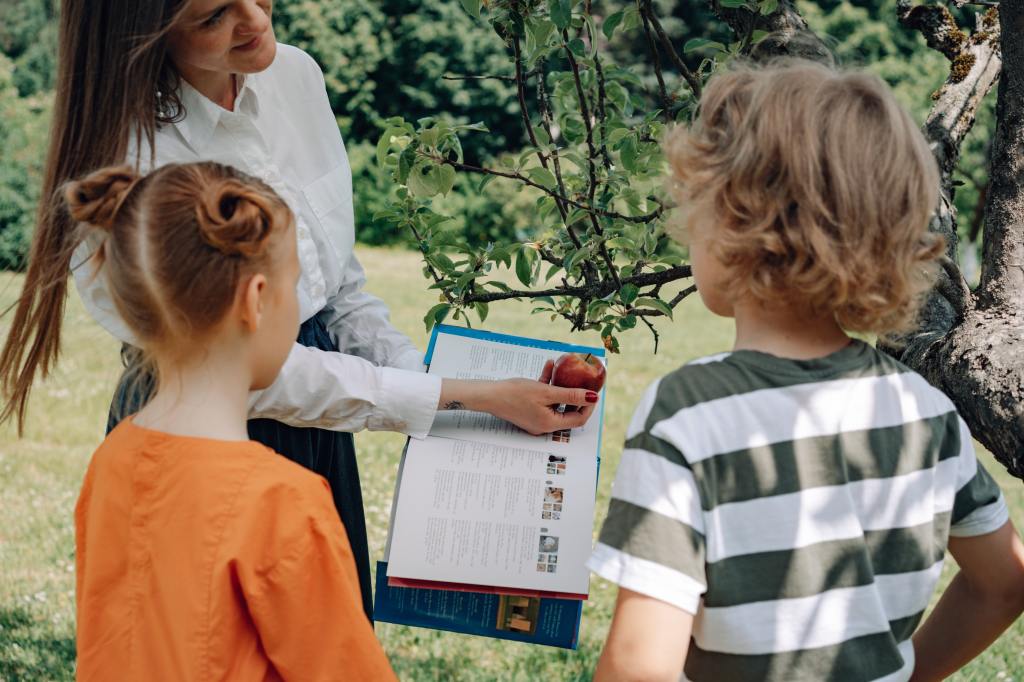
School gardens can be integrated into a range of subjects and learning activities. Here are some curriculum ideas for school gardens:
Science: Learn about plant growth, soil health, and the life cycle of plants.
Math: Use the garden to teach measurement, geometry, and data analysis.
Language arts: Write garden journals, poetry, or stories about the garden.
Social studies: Learn about the history of agriculture, food systems, and cultural traditions related to gardening.
Art: Use the garden as inspiration for art projects such as painting, sculpture, or photography.
Nutrition: Learn about the nutritional value of different fruits and vegetables, and use the garden to prepare healthy meals and snacks.
If you enjoyed this blog, please LIKE, Follow, Share & leave me a comment! I love your feedback!
If you aren’t following me on Facebook & Instagram go on over & give a LIKE & Follow me for daily tips & tricks for your home & garden!
Added bonus: You can go to my blog at http://www.fordragonfliesandme.com to purchase my original cookbook, Lovingly Seasoned Eats and Treats in either a spiral bound soft cover OR NEW, a Downloadable PDF version. The cookbook has almost 1000 recipes on almost 500 pages! Check out the Cookbook Testimonials while you’re there!
Until next time remember to,
Eat fresh, shop local & have a happy day,
Jean
All text and images on this site are copyright of For Dragonflies And Me. Unless otherwise noted, you may not use this content.
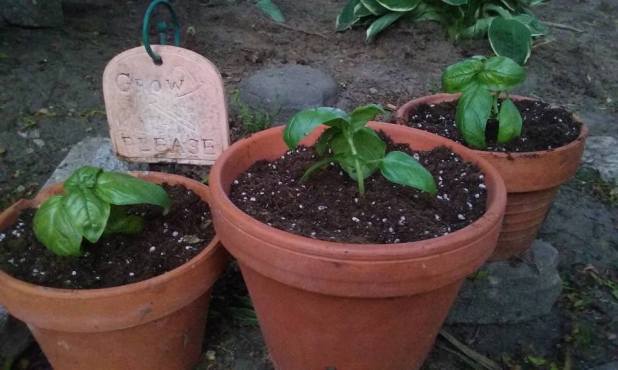
“It is a good idea to be alone in a garden at dawn or dark so that all its shy presences may haunt you and possess you in a reverie of suspended thought.” James Douglas
You all know how much I love my herbs, so taking care of them and ensuring they continue to grow & thrive is essential to a bountiful harvest. Dividing them helps to keep them from getting too crowded, which can lead to poor growth and disease.
In this guide, I’ll be taking you through the benefits of dividing overgrown herbs, signs that your herbs need dividing, the best time to divide overgrown herbs, tools needed for dividing herbs, steps for dividing overgrown herbs, tips for planting and caring for divided herbs, common mistakes to avoid when dividing herbs, and recommended herbs to divide. So now lets get rolling friends!

Dividing overgrown herbs is a great way to keep your herbs looking and tasting their best. When you divide your herbs, you’re essentially creating new plants from one plant. This means that the new plants will have fresh, healthy roots and plenty of space to grow. Dividing your herbs can also help to promote new growth and increase the yield of your herb garden. And that’s what we want right friends… more herbs!
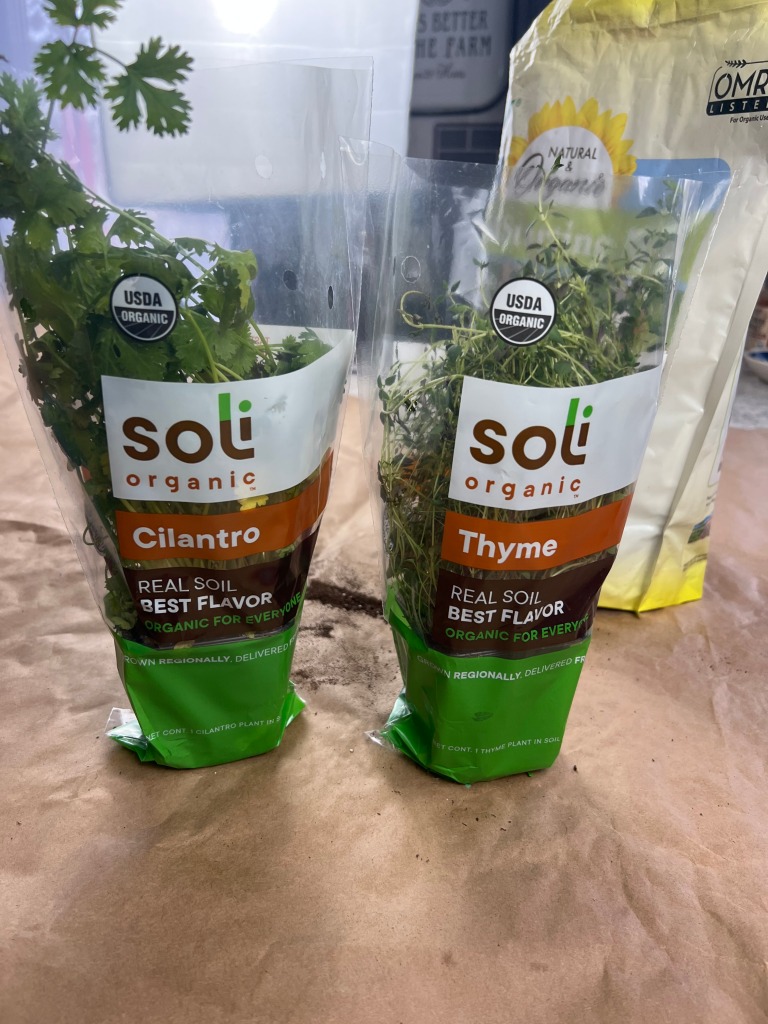
So, how do you know when it’s time to divide your herbs? There are a few signs to look out for. If your herbs are looking crowded or are starting to wilt, it’s probably time to divide them. You may also notice that your herbs are not growing as well as they used to, or that they are producing fewer leaves or flowers.
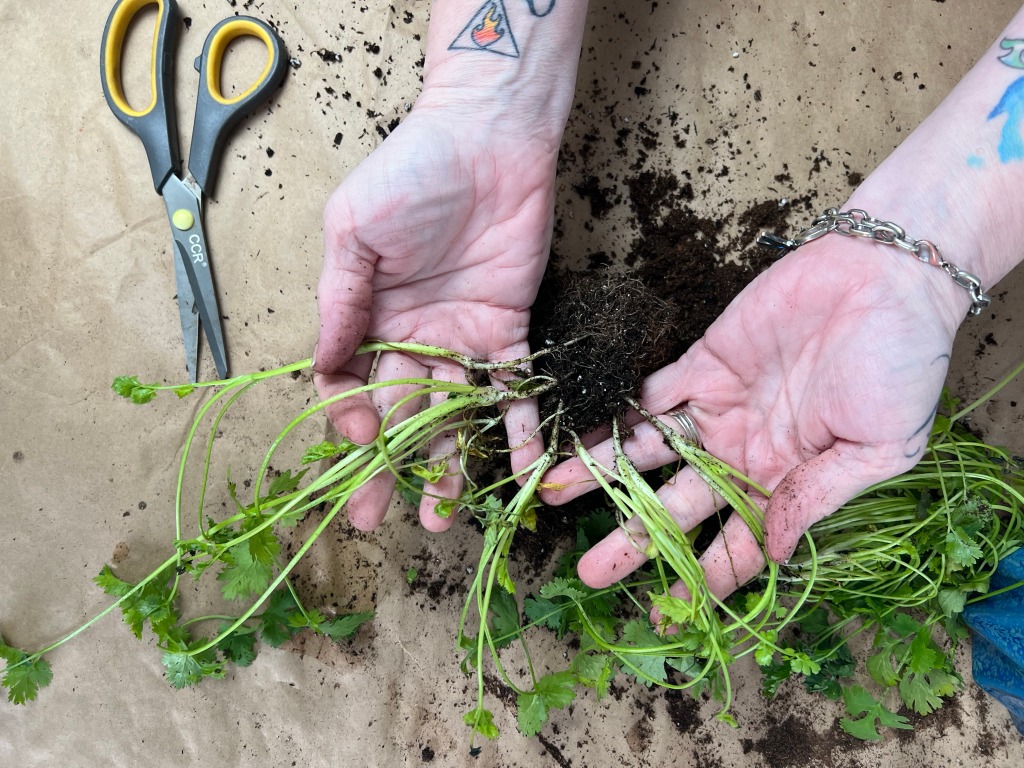
The best time to divide overgrown herbs is in the early spring or fall. This is when the plants are not actively growing, which makes it easier to divide them without causing too much stress. It’s also important to divide your herbs when the soil is moist, as this will help to minimize shock to the plants. If the soil is dry, I advise watering the soil and letting it set for about an hour before you divide.
To divide your herbs, you’ll need a few tools. These include a sharp pair of pruning shears or scissors, a garden fork or spade, and a container or pot for your new plants. You may also want to have some compost or fertilizer on hand to give your new plants a boost. If you are dividing herbs you purchased from a garden center still in its original planter, then you’ll need to carefully remove the plant and separate. See my video.
Not all herbs need to be divided, but some do better when they are divided regularly. Here are a few herbs that are great candidates for dividing:
Now that you have all of your tools ready, it’s time to start dividing your overgrown herbs. Follow these steps if you are dividing plants you already have planted or if you are dividing plants still in their original container:
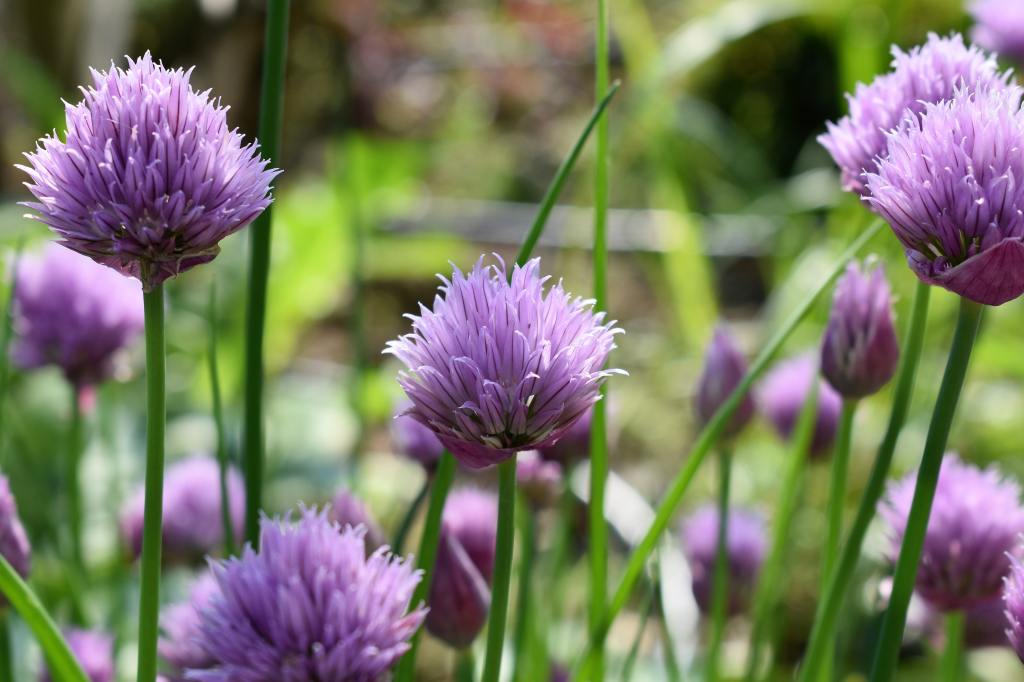
After dividing your herbs, it’s important to give them the proper care to ensure that they thrive. Here are a few tips to help you out:
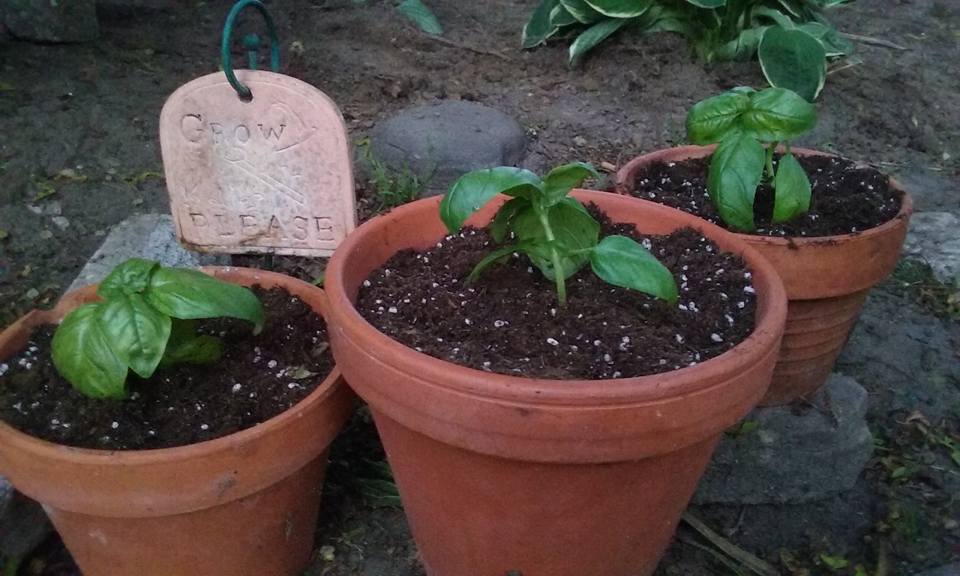
Dividing overgrown herbs is a relatively simple process, but there are a few common mistakes that you’ll want to avoid. These include:
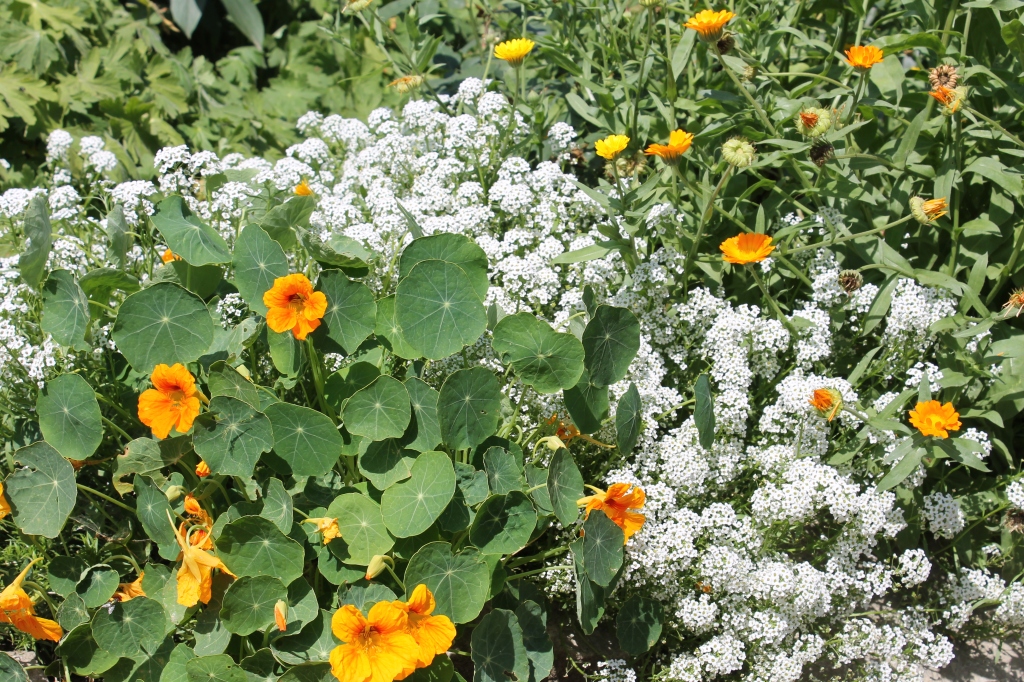
Dividing overgrown herbs is an important task for any herb gardener. By dividing your herbs, you’ll be able to keep them healthy and productive year after year. Remember to divide your herbs in the early spring or fall, and be sure to give them the proper care and attention they need to thrive. With a little bit of effort, you’ll be rewarded with a bountiful harvest of fresh, flavorful herbs that you can use in all of your favorite recipes.
If you enjoyed this blog, please LIKE, Follow, Share & leave me a comment! I love your feedback!
If you aren’t following me on Facebook & Instagram go on over & give a LIKE & Follow me for daily tips & tricks for your home & garden!
Added bonus: You can go to my blog at http://www.fordragonfliesandme.com to purchase my original cookbook, Lovingly Seasoned Eats and Treats in either a spiral bound soft cover OR NEW, a Downloadable PDF version. The cookbook has almost 1000 recipes on almost 500 pages! Check out the Cookbook Testimonials while you’re there!
Until next time remember to,
Eat fresh, shop local & have a happy day,
Jean
All text and images on this site are copyright of For Dragonflies And Me. Unless otherwise noted, you may not use this content.
Everything Organic
Tina Marshall
A blog about my spiritual journey in the Lord Jesus Christ.
Livegood
"If we want to explore deeper oceans, we first have to leave sight of the shore.”
Grow your own veg
Online marketing, tools, services and informations
The Musings of a Writer / Freelance Editor in Training
Past to Future in a Picosecond
Hi, I'm Avisha Rasminda Twenty-Two years old, Introduce Myself As A Author , Painter , A Poet.